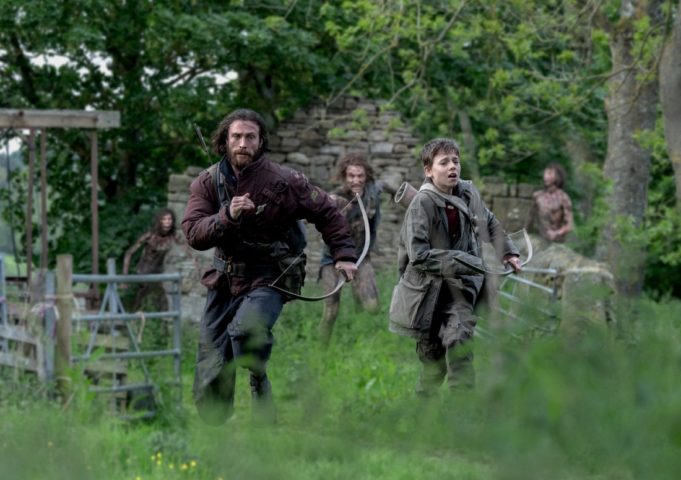Okay, this is easy. We’re getting more entertainment about the long-term effects of zombies because we ourselves survived a global plague that has killed some 7 million people. Thus, the TV shows The Walking Dead and The Last of Us, and now the 28 Days Later series have all reckoned with how people have adjusted to the reality of zombies and carried on, or failed to. 28 Years Later reunites director Danny Boyle with screenwriter Alex Garland, and it serves as a memorial from the survivors of Covid to the many who did not make it, which turns out to be not quite enough to carry it.
After establishing that the rage virus was confined to Britain and Ireland, the movie gives us Spike (Alfie Williams), a 12-year-old boy growing up on an island off England’s northern coast that’s connected to Britain by a narrow causeway that is underwater at high tide. This has allowed the island’s population to remain uninfected while some of them make forays to get supplies and kill zombies with bows and arrows. Indeed, we see Spike go out with his dad (Aaron Taylor-Johnson), who shows him how to survive out there.
The island has no doctor, though, so nobody can tell what is wrong with Spike’s mother (Jodie Comer), who suffers frequent headaches and nosebleeds. When Spike hears about an actual licensed doctor (Ralph Fiennes) who has survived in Britain, he ignores the warnings that the man has gone insane and takes her out to see him, though she spends half the journey thinking that Spike is her father.
The best thing unquestionably is the performance by the young Williams as someone who is still very much a kid underneath his dad’s survival training — he makes funny faces at his Mum to make her laugh. Later, the realization dawns on Spike that there’s not much anyone can do for her, especially in this reality. Because of this gifted newcomer (who’s from Newcastle, so his native accent is spot-on here), the movie works as a coming-of-age story about a boy who’s changed by his experiences away from his childhood home.
I just wish it worked better as a zombie movie. The set pieces don’t measure up to the ones in the previous films, and while we do learn what happens when a zombie is pregnant, the bits of lore don’t add much to our understanding of this fictional world. World-building is supposed to be what this installment is about, and Spike’s concluding encounter with a group of zombie-slaying ninjas led by a bleached-blond preacher (Jack O’Connell) doesn’t do enough to whet the appetite for the scheduled next film. Spike’s meeting with a Swedish sailor (Edvin Ryding) marooned on Britain who grew up with all the modern conveniences that Spike doesn’t know about doesn’t yield anything interesting, either, and the pacing suffers once the boy reaches that doctor.
The original 28 Days Later contained Boyle and Garland’s great contribution to the zombie subgenre, as the 2002 movie depicted their revenants tearing after the living in crazed fashion. Nothing they’ve come up with since has matched that, and their evocation of a depopulated Britain as a hellscape is no longer as hellish as it was. It’s likely just as well that Nia DaCosta is slated to take over the series. As for the current film, it has the giant pyramid of skulls that the doctor has erected in his front yard as he explains to Spike the meaning of the Latin phrase “memento mori,” which ties together the boy’s story amid his fictional plague and our own real-life pandemic. Take from that what you will.
28 Years Later
Starring Alfie Williams and Ralph Fiennes. Directed by Danny Boyle. Written by Alex Garland. Rated R.












